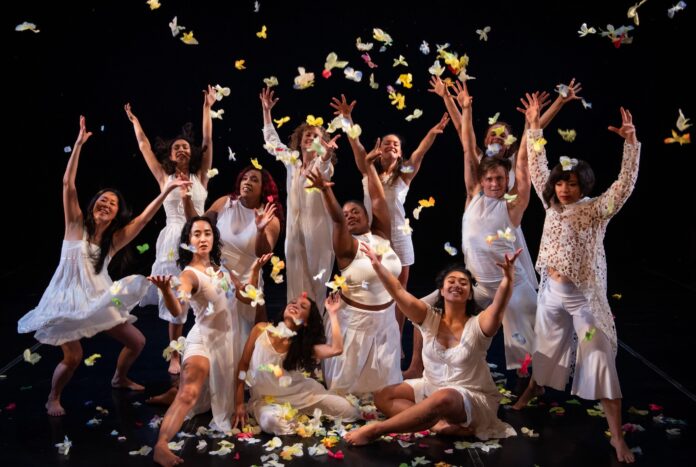The gut punch of the 2024 presidential election still throbs, and many of us haven’t scraped ourselves off the mat just yet.
Dance Brigade Artistic Director Krissy Keefer, however, true to form, is already back out on the road with her latest call to action. “I don’t know what else to do,” says Keefer when asked why she chose to launch a 7-city tour of A Woman’s Song for Peace starting in Eugene, OR on January 9 and culminating at the Herbst Theater in San Francisco on January 19, eve of the presidential inauguration.
Featuring iconic musician Holly Near and seminal queer feminist singer-songwriter Ferron, alongside Keefer’s Dance Brigade—now celebrating 50 years—A Woman’s Song for Peace is a cry to end all wars so that peace and justice can prevail, not only in the Middle East, but also in Sudan, Ukraine, and at the US borders and in its cities. Keefer, Near, and Ferron, all in their 70s with years of national and international touring behind them, and a legacy of activism undergirding their careers, agree that going on the road, getting on stage and connecting with audiences at this moment is inevitable.
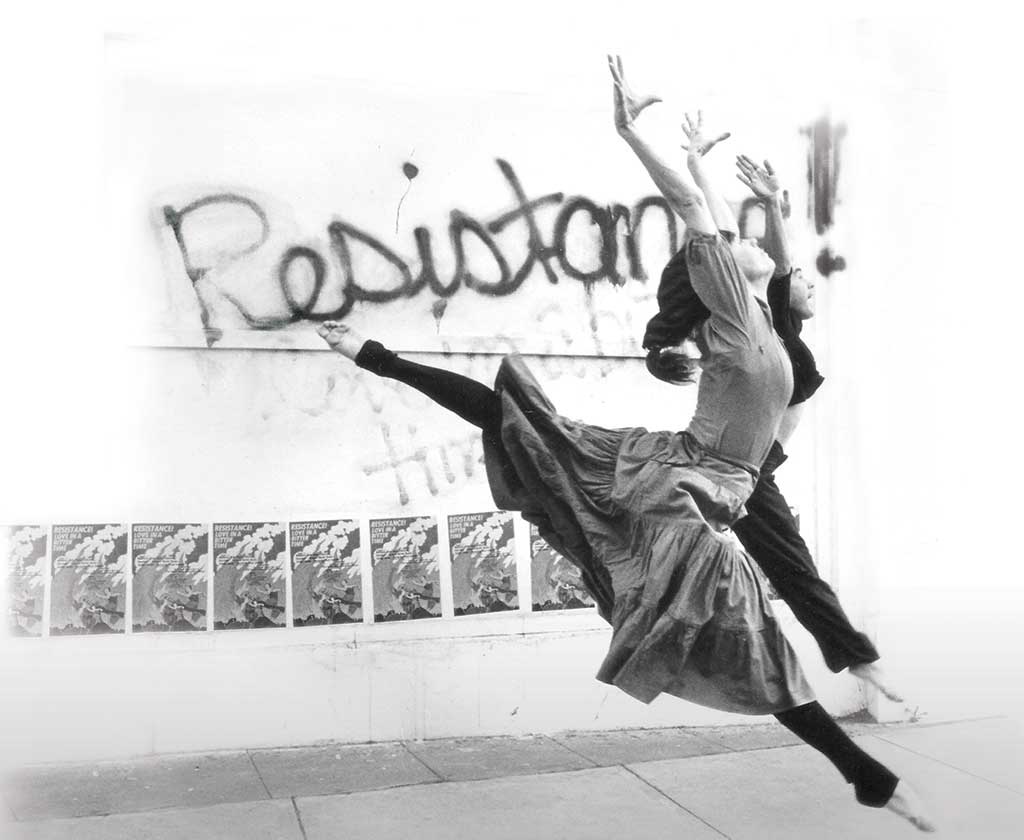
Motivated in particular by the war in Gaza, having toured the Middle East in 2012 to performing in Beirut and visit refugee camps, Keefer recalls the impact firsthand. She says, “I’m so devastated that this is going on with the number of people who are being killed.” With a dual focus on peace and women’s activism, the latest tour had the potential to be one thing or another depending on the outcome of the election.
“I began planning the tour when Biden was running against Trump because we need to be reminded about peace. When we were putting a script together we said that if Kamala won, our audience would have seen this as a celebration tour,” she says. “Now it’s a rebellion and resistance tour, because we reject what the new administration is planning to do.”
Ferron, on the other hand, was not so optimistic about taking up the cause. The distinctive Canadian folk singer-songwriter and poet whose gritty style helped birth a 1990s underground movement was reluctant if not downright reticent. “About 3 weeks before Kamala took the run for it, I couldn’t get out of bed,” she says. “I was so depressed. It was triggering PTSD in me. Then she started campaigning and her crowds were huge. I just couldn’t believe that she didn’t win. I should have believed it, I guess, being that she is a woman and not white. For days, I just wondered how she felt. She must have felt horrible.”
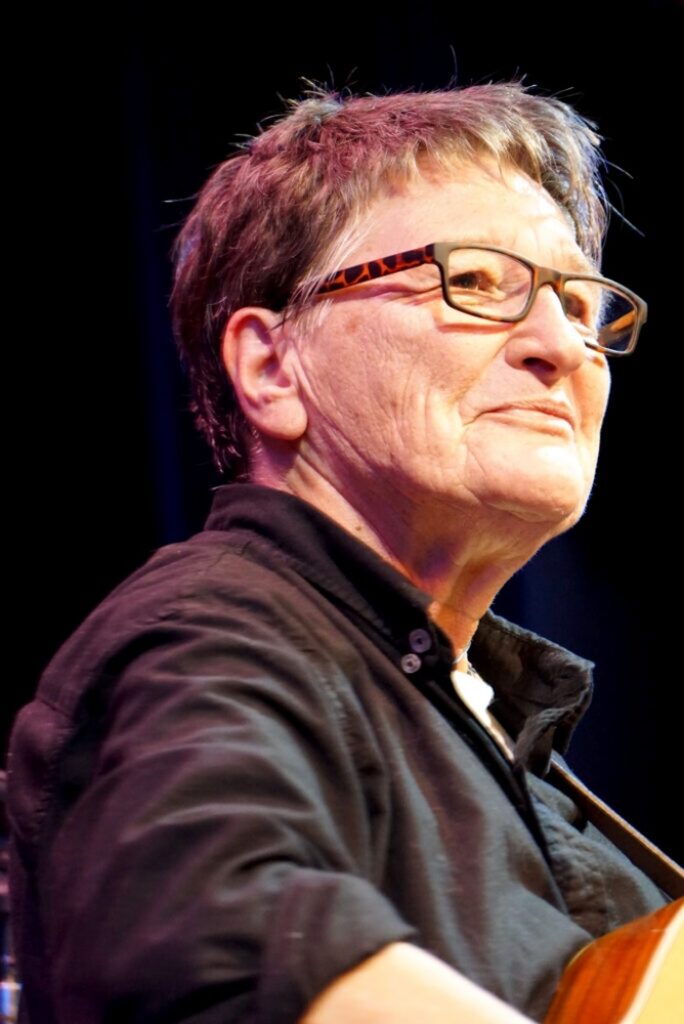
To join A Woman’s Song for Peace, Ferron will be leaving her small island community in Vancouver to participate in the tour, something she rarely does these days, preferring instead to host intimate writing and creativity workshops rather than performing or getting on a plane.
Ferron says, “Krissy texted me, ‘Would you be interested in doing something for peace?’ I wanted to say no. I didn’t want to be in San Francisco around the inauguration. I didn’t want to be in the States. It didn’t feel safe, but I agreed to it. I thought, what the hell. I think that we need to fill up the space in which people are trying to put fear and anxiety. We need to fill it with hope and love. It sounds a little naive that women are going to go out and fight for peace, but what the hell else are we going to do? I don’t want to be in a fear mode. I want to be in peace mode.”
The show includes two musical sets, one performed by Near and the other by Ferron, and two performances by Dance Brigade, with its powerful combination of full throttle dancing and taiko drumming. “I think there will be a lot of fun, surprises and power,” says Ferron. “The dancers really bring the power. They can really bring rage. Yes, it’s about peace, but they’re telling us we’re supposed to be afraid now and the only way to not be afraid is to be in power.”
Keefer says, “People my age, people who have been activists since the ’70s and ’80s, we feel like we’ve done our part, but we still can’t give up.” Keefer acknowledges that this work, the 50 years of art-activism by Dance Brigade, is important now more than ever.
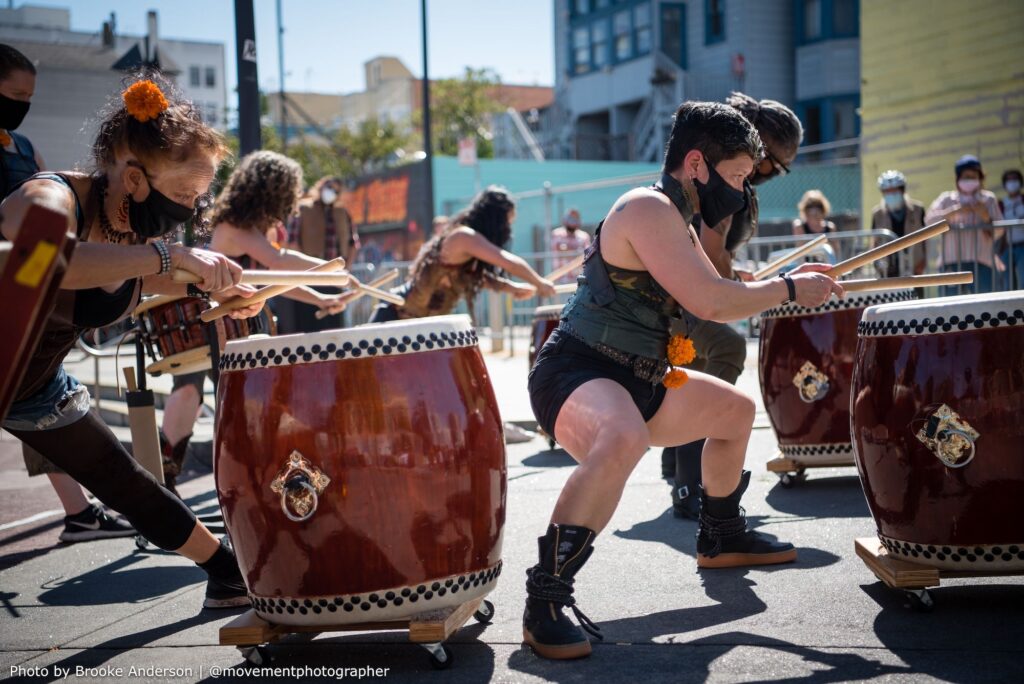
Giving up is, in fact, is anathema to Keefer’s general make up. She has led Dance Brigade in the Bay Area since 1984, originally founded in 1975 as the Wallflower Order Dance Collective in Eugene, OR. This all-female ground-breaking and influential dance company toured nationally and internationally throughout the 1970s, was dubbed an “American Treasure” by the Kansas City Star and included in dance critic, author, and choreographer Deborah Jowitt’s book,Time and the Dancing Image. With Dance Brigade Keefer has carried on the legacy of provocative, feminist dance, producing cutting-edge productions that explore the intersection between art and social justice.
Dance Brigade is the resident company of Dance Mission Theater—now also celebrating its own 25th anniversary—an artist-driven organization dedicated to building community, addressing social justice issues, exploring cultural identities, promoting inclusivity, and creating a more peaceful world through collective action. Many women artists, artists of color, and culturally specific ensembles consider Dance Mission to be their artistic home. Master teachers of dance and music have created a thriving intergenerational community there, celebrating cultural traditions and welcoming students of all backgrounds.
Dance Mission Theater is home to GRRRL Brigade, an intensive dance/leadership development program designed to provide high quality dance training, performance opportunities, and a sense of self-empowerment for San Francisco’s girls ages 9 to 18. The girls are instructed by some of the San Francisco Bay Area’s leading dance and taiko artists. A Woman’s Song for Peace includes two recent graduates of the GRRRL Brigade, among the multi-generational cast of over 25 dancers, musicians, taiko drummers and performers, ranging in age from 18 to 75.
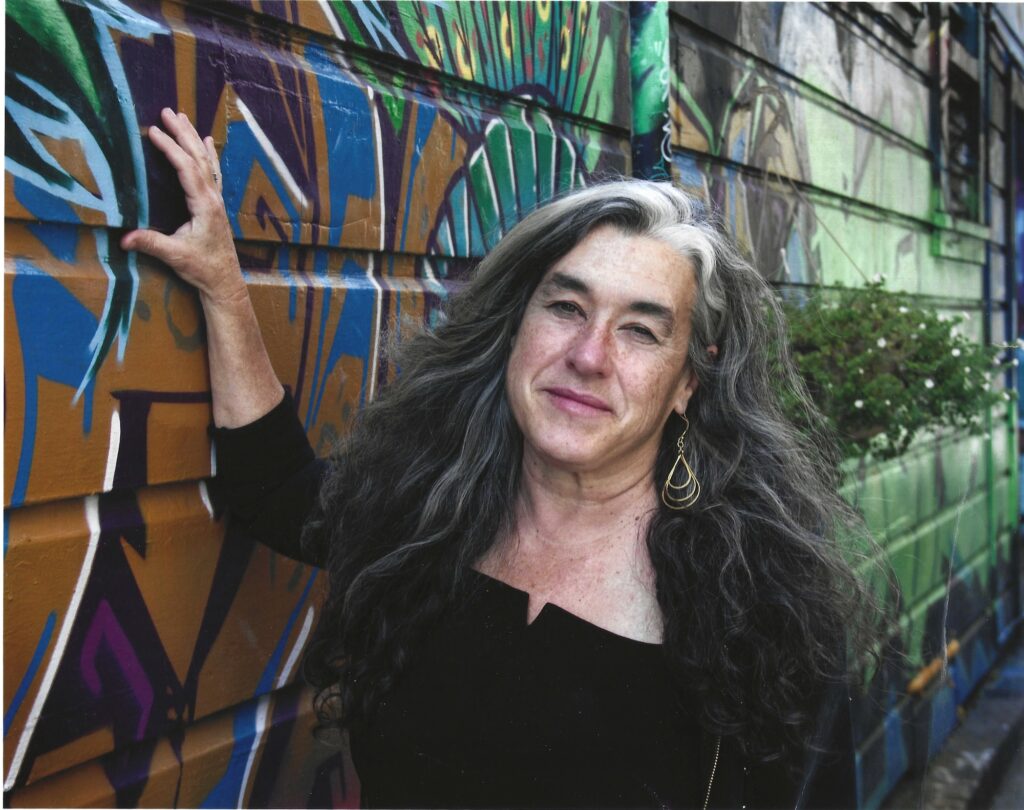
Keefer recalls what it was like to tour in the 1970s, comparing it to what she’s hoping to experience this time around: “At the end of the Vietnam War, the focus shifted from external to internal and what was happening in the US with the women’s movement, Black Panthers, solidarity with Latin America. Our audience was a very interested, political, women-driven audience. Dance Brigade was everywhere,” she says. “It was the glory days of women’s art. This tour is born out of that. It’s meant to be a continuation of those early days when we were sure, so confident that we could make a difference, that we could make the world more fair.”
She adds, “People my age—from the 1970s and 80s—feel like we’ve done our part, but we can’t give up.”
“Artists can serve a meal of nourishment, of perspective, of courage,” says musician Holly Near when asked how attending a performance can contribute to positive change at a time when many are exhausted, hopeless, and fearful. “People think better when they are not culturally starved. We get hit daily by news that is so discouraging, so toxic. An event like this is medicine for the artists, the organizers, and the community. We sometimes forget in the privacy of our homes that we need nourishment. I encourage people to come sit at the table. We will do our best to feed you.”
After 50 years of bold work, Near is still one of the most consistent and well-informed voices for change. An outspoken singer and ambassador for peace, her work is loving, challenging, funny, thought-provoking, and remains rooted in the global community. A recipient of dozens of awards from organizations such as the ACLU and the National Organization of Women, Near was one of Ms Magazine’s Women of the Year recipients and has been nominated for Grammys as well as the Legends of Women’s Music Award.
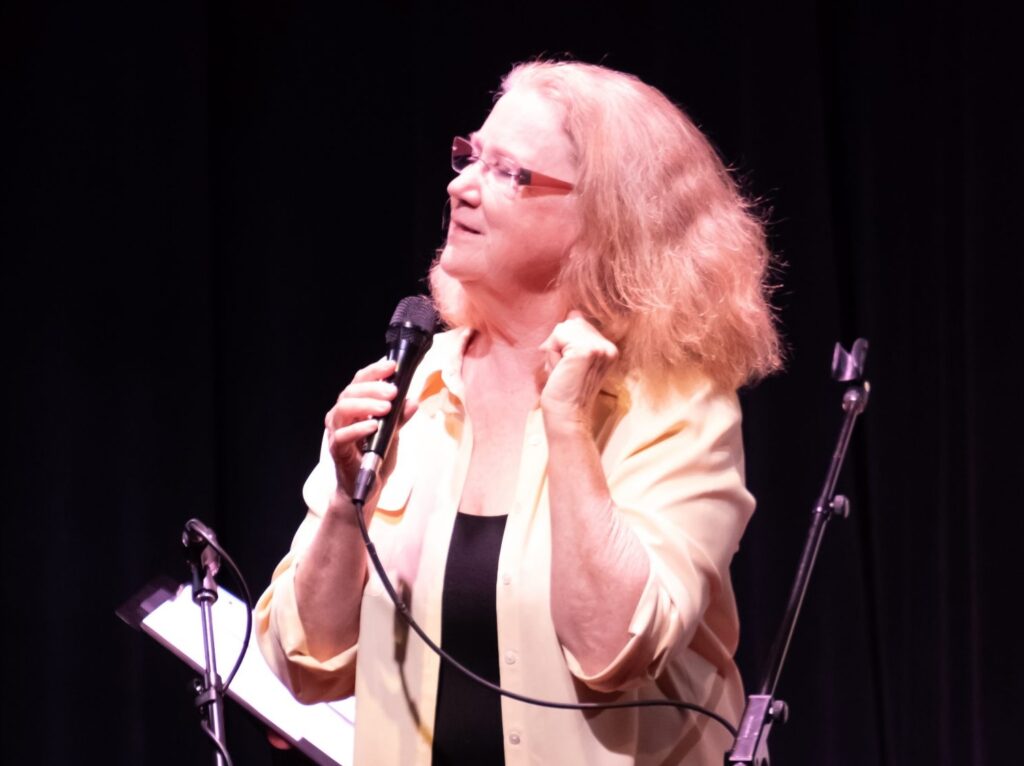
She explains, “If I do my job right, perspectives are shared, lives are changed, questions are asked, failures acknowledged, and perhaps most importantly, people are moved and entertained. I try to never forget that I am a singer. I suppose touring has changed a bit since I had cancer and a stroke a few years ago. I have had to learn how to move in and around the consequences of that. All the women playing in the band for this event have traveled with me off and on since my health issues, all being so supportive.”
Collectively, the artists of A Woman’s Song for Peace believe that this collaboration can unify and activate people. “We offer it as a gift to our communities for healing, transformation, and a vision for a way forward,” says Keefer. And what happens after the tour? Ferron points out that someone already has a January 18 demonstration booked in Washington, DC, adding, “I feel like we were born for this. I know I was.“
Bay Area performances of A Woman’s Song for Peace take place January 15 at Center Theatre of Mendocino College in Ukiah, January 17 at the Luther Burbank Center for the Arts in Santa Rosa, January 18 at Crocker Theater of Cabrillo College in Aptos, and January 19 at Herbst Theater in San Francisco. Tickets and info here.

